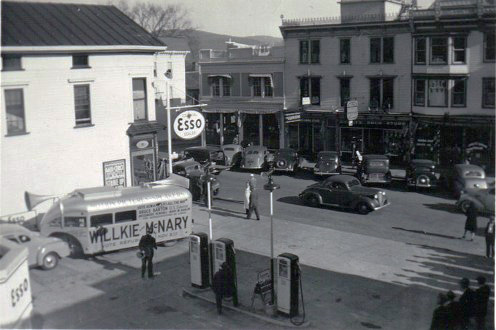
The GOP campaign trailer stopped at the Esso station on Margaretville’s Main St., Oct. 14, 1940
He was nowhere near Margaretville but his presence loomed large on October 14, 1940 when the “GOP Motion Picture Caravan” streamed in to town to campaign for Republican Presidential hopeful Wendell Wilkie, who was fighting an uphill battle against Franklin D. Roosevelt.
The sleek trailer, one of several criss-crossing the country stumping for Wilkie and his running mate, Charles McNary, was described as “the last word in the modern technique of political campaigning,” according to the Catskill Mountain News, whose publisher, Roswell Sanford, was Middletown GOP Chairman.
The trailer was equipped with “a projector for showing sound movies on a 5 by 7 screen, an amplifying system, radio and two phonograph tables for reproducing speeches. . . As many as 12,000 have gathered around one of the trailers and have stood for hours listening to the music and watching the movies which show Wendell L. Wilkie. It is a thrilling departure from the traditional cut-and-dried form of street corner meetings. It gives the audience an opportunity to see the candidate on the screen and to hear his voice.”
And boy, could they hear it, whether they wanted to or not: “On the open road when the sound equipment is operated at maximum intensity, the voice can be heard over a distance of four miles,” the paper reported. (Note the giant sperakers on the trailer’s roof in photo, which was posted to the Delaware County History and Genealogy website by Jim Kelly.)
A “union crew of technicians” traveled with the trailer, which was accompanied by local candidates. Hitting as many towns and villages in the state as they could reach, the entourage stopped to provide ‘shows’ at Hancock, Walton and Sidney October 12, and , after passing through Andes, Margaretville, Fleischmanns, and Roxbury, gave an evening presentation at Stamford October 14.
Whether it was the impressive use of media, or Wilkie’s anti-Roosevelt and New Deal platform, Delaware County voted Republican in a big way that November: 15,837 to 5,946. In Middletown, Wilkie won 62% of the votes, 1,223-723.
The Democrats carried the country though, and Roosevelt , with Vice President John Nance Garner, was swept into his third term of office.
Wilkie, born to German immigrants, was a World War I veteran, and Indiana lawyer. After the election, the Democrat-turned Republican joined ranks with the man who defeated him, becoming FDR’s unofficial ambassador advocating internationalism over isolationism as World War II began.
Had he and Senate Minority Leader McNary been elected, the country would have been in the position of replacing both of them during their term of office, as they each died suddenly in 1944.
An interesting sidebar to the local 1940 election: The Roxbury correspondent to the News reported that a Civil War veteran and a Civil War widow — 101-year-old Charles Dugan, and 90-year-old Martha Whitney — voted within moments of each other at the Masonic Hall in Roxbury. Dugan had voted in every presidential election since casting his first ballot, for Abraham Lincoln, in 1860. Mrs. Whitney was the widow of Jonathan Whitney, who served with the 80th NYS Regiment from Halcott.
